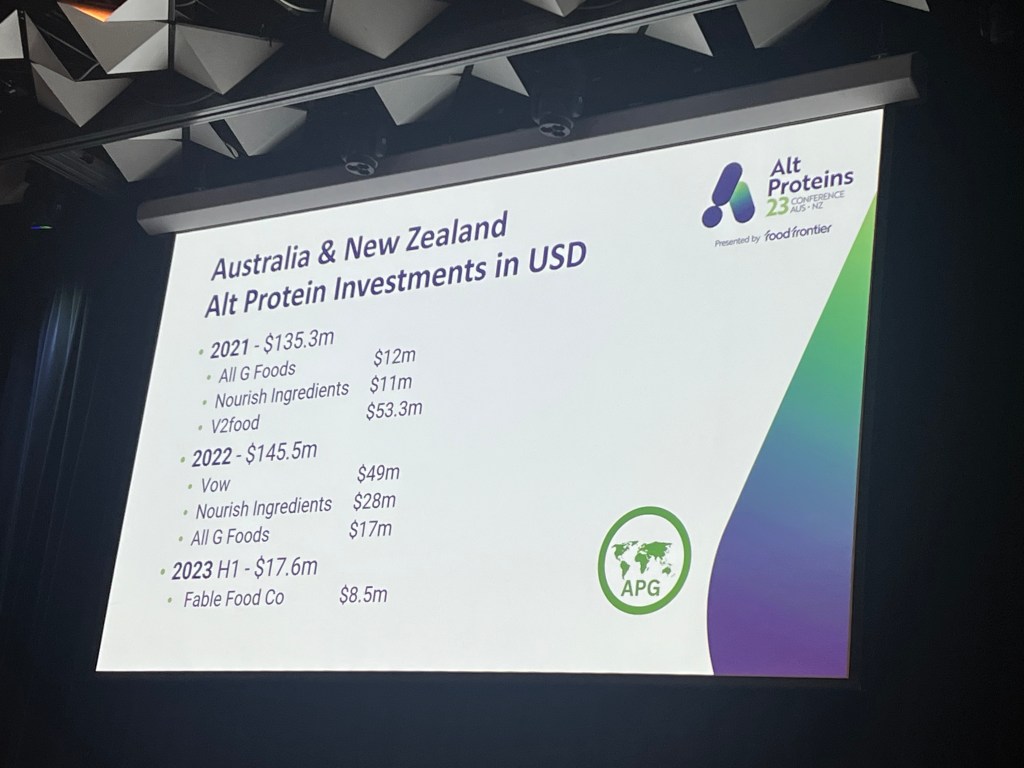Thomas King, Founder and Chair of think tank Food Fronter, laid out a six-tier strategy to expedite development in Australia’s alternative protein sector at the recent AltProteins 23 conference in Melbourne.
Citing data from market research firm Alternative Proteins Global (APG), King said that despite a global decline in funding, Australia and New Zealand’s alt protein sector saw a spike in capital injection of roughly $99 million USD in the second half of 2022, 10% higher than global funding for that same period.
King added that Australia also leads the Asia Pacific as the country with the most cellag deals and most funded startups, representing 40% of APAC’s total investment.
King also referred to estimates from Food Innovation Australia (FIAL) and Australia’s government science agency CSIRO that foresee the alternative protein products category in Australia becoming a $6 billion opportunity by 2030.

In his presentation, King – who was named Sustainable Entrepreneur of the Year at the CommBank Young Hero Awards earlier this year – laid out the think tank’s recommendations for the industry to meet this forecast, the focus areas being: industry collaboration; consumer preferences; government support; private sector investment; narrative building; and sustainability.
1. Deepened industry collaboration
King began by addressing the need for industry players to work together to build the overall ecosystem:
“A huge level of genuine collaboration is required, and a collective impact mindset from ecosystem wide coordination to one-plus-one equals three partnerships will yield greater results for all involved. The idea that every cellular agriculture company can successfully develop end-to-end production – or that every plant-based business can own and run a profitable facility – is simply unrealistic,” King said.
He added that M&As along with partnerships are signs of a maturing market, and that it is “…much easier to accelerate growth by using the proven capability of others, whether in IP infrastructure or distribution networks.”

2. Prioritizing the consumer via R&D
King noted that vast opportunities exist across the value chain to improve taste, texture and performance through R&D, aspects that most consumers will not compromise on, meaning the consumer must remain the priority.
3. Proactive government support
King commented on how policymakers play a fundamental role in enabling development of new innovation and that alternative proteins were an excellent example.
“With the changing climate and growing global protein demand, policymakers need to look at food security as a wicked challenge, and one that Australia and New Zealand are perfectly positioned to further address. Now is the time for governments to step forward with greater funding incentives, partnerships, and enabling policies, or we risk losing out to other regions,” King said.
4. Continued private sector investment
In light of the past year’s capital drain in alt protein, King noted the ongoing importance of private sector investment, which requires “…investors who are patient and practical, who understand the timelines involved in scaling new food and biotechnologies. A field like cellular agriculture presents immense potential, but it’s not without its complexity, scale up and regulatory hurdles, and public education requirements, all of which require considerable time and resources.”
5. Simple and consistent narrative building
King emphasized how food choices among consumers are driven by emotion rather than logic, and that consumers were not interested in eating what can be perceived as a science experiment.
“Many of us might view alt proteins as technology, but to the consumer, it’s food, meaning messaging and marketing needs to be informed by social researchers, creatives, food culture influencers, and leaders in gastronomy to help educate, excite, and delight.”
6. Nutrition, health, and the environment
Lastly, King spoke about how important the nutrition, health, and environmental factors were to the development of Australia’s alt proteins sector.
“New research, formulations, manufacturing, tech and culinary innovation present an opportunity to further reduce ingredient lists, degrees of processing, enhanced nutrition while enabling things like better carbon measurement and more sustainable packaging. And cellular agriculture has a similar scope for continued health and environmental focus.”
King also announced that Food Frontier plans to publish its next state of the industry report in the first quarter of 2024.
To stay up-to-date on the latest industry headlines, sign up to Future Alternative’s enewsletter.


